PUBLIC ENEMY
Public Enemy is an American hip hop group consisting of Chuck D, Flavor Flav, Professor Griff and his S1W group, DJ Lord (DJ who replaced Terminator X in 1999), and Music Director Khari Wynn. Formed in Long Island, New York in 1982, Public Enemy is known for their politically charged lyrics and criticism of the American media, with an active interest in the frustrations and concerns of the African American community.
In 2004, Rolling Stone Magazine ranked Public Enemy number forty-four on its list of the Immortals: 100 Greatest Artists of All Time. Acclaimed Music ranks them the 29th most recommended musical act of all time and the highest hip-hop group. The group was inducted into the Long Island Music Hall of Fame in 2007.
After a 1994 motorcycle accident shattered his left leg and kept him in the hospital for a full month, Terminator X relocated to his 15-acre farm in Vance County, North Carolina. By 1998, he was ready to retire from the group and focus full-time on raising African black ostriches on his farm.
In late 1998, the group started looking for Terminator X's permanent replacement. Following several months of searching for a DJ, Professor Griff saw DJ Lord at a Vestax Battle and approached him about becoming the DJ for Public Enemy. DJ Lord joined as the group’s full-time DJ just in time for Public Enemy’s 40th World Tour. Since 1999, he has been the official DJ for Public Enemy on albums and world tours while winning numerous turntablist competitions, including multiple DMC finals.
- Public Enemy's "Fight the Power" plays a central role in Spike Lee's 1989 film "Do the Right Thing." In addition to opening the film with the actors dancing to the song, Character "Radio Raheem" carries his beat-box everywhere listening to the same song, prompting one character to ask if he ever listens to anything else. Radio Raheem acts surprised and explains "It's Public Enemy!"
- The song "Power of Equality" by the Red Hot Chili Peppers makes a reference, saying, "I got tapes I got CDs, I got my Public Enemy." The band have also performed segments of Public Enemy's You're Gonna Get Yours as an intro to their song Give It Away at concerts.
- John Connor in the 1991 movie Terminator 2: Judgement Day wore a Public Enemy t-shirt for the majority of the film.
- Part of NOFX song Franco Unamerican says "I´m watching Michael Moore expose the awful truth, I´m listening to Public Enemy and Reagan Youth."
- The episode of Futurama titled 'Fear Of A Bot Planet' is a reference to the album 'Fear Of A Black Planet'
- Shawn Wayans' stage name while serving as DJ on "In Living Color" was SW1, a reference to Public Enemy's S1Ws.
Band members:
- Chuck D – MC (1987–present)
- Flavor Flav (William Drayton) - hype man, occasionally lead vocals
- Khari Wynn - Music Director
- DJ Lord (Lord Aswod) - DJ
- Professor Griff
Former members:
- Terminator X (Norman Rogers) - DJ, producer
- Big Casper (Tracy Walker)
- Brother James (James Norman)
- Brother Roger
- The Interrorgator (Shawn K Carter),
- Crunch
- Jacob shankle AKA (big Jake)
- The Bomb Squad
* Hank Shocklee (James Henry Boxley III)
* Keith Shocklee (Keith Boxley)
* Eric "Vietnam" Sadler
* Gary G-Wiz (Gary Rinaldo)
* Kerwin "Sleek" Young
* Professor Griff (Richard Griffin)
* Johnny "Juice" Rosado
- Brian Hardgroove - bassist
Discography:
YO! BURM RUSH THE SHOW
(1987)
Yo! Bum Rush the Show is the debut album of American hip hop group Public Enemy, released January 26, 1987 on Def Jam Recordings in the United States. The group's logo, a silhouette of a black man in a rifle's crosshairs, is debuted on the album's cover. Yo! Bum Rush the Show features a sample-heavy sound by production team The Bomb Squad.
The album peaked at number 125 on the U.S. Billboard Top LPs chart and at number 28 on the Top Black Albums chart. NME magazine named it the best album of the year in its 1987 critics poll. Along with the Beastie Boys Licensed to Ill (1986) and LL Cool J's Radio (1985), music writer Cheo H. Coker has cited Yo! Bum Rush the Show as one of three of the most influential albums in hip hop history. In 1998, it was selected as one of The Source's 100 Best Rap Albums. In 2003, the album was ranked number 497 on Rolling Stone magazine's list of the 500 greatest albums of all time.
According to Jon Pareles of The New York Times, "From its first album, Yo! Bum Rush the Show in 1987, the group marketed itself as a distillation of black anger and resistance. It set out to be the voice of a community, not just one more posse of boasters". Yo! Bum Rush the Show debuts The Bomb Squad's sample-heavy production style, which is prominent on the group's following work. Joe Brown of The Washington Post described the album's music as "a more serious brand of inner-city aggression", in comparison to Licensed to Ill (1986) by Def Jam label-mates the Beastie Boys. On its musical style, Brown wrote "Public Enemy's mean and minimalist rap is marked by an absolute absence of melody - the scary sound is just a throbbing pulse, hard drums and a designed-to-irritate electronic whine, like a dentist's drill or a persistent mosquito". The album's sound is accented by the scratching of DJ Terminator X. Chicago Tribune writer Daniel Brogan described Public Enemy's style on the album as "raw and confrontational", writing that the group "doesn't aim to -- or have a chance at -- crossing over".
- Q magazine (9/95, p. 132) - 4 Stars - Excellent - "...a stunning opening...just the first, in retrospect almost shy, step on a remarkable journey...a hard, droning extension of the basic drum`n'scratch Def Jam template that had served LL Cool J and the Beastie Boys so well."
- Melody Maker (7/22/95, p. 35) - Recommended - "It wasn't just a new sound, a discovery. It was like being struck by a meteor."
- NME (9/25/93, p. 19) - Ranked #49 in NME's list of The 50 Greatest Albums Of The '80s.
- NME (7/15/95, p. 47) - 9 (out of 10) - "Yo! Bum Rush The Show announced a hip-hop group who smouldered beneath dark, sparse beats like no other, introduced us to the coolest vocal double act ever...and featured as striking a statement of intent as you could wish for in `Public Enemy Number 1'....brilliant."
IT TAKES A NATION OF MILLIONS TO HOLD US BACK
(1988)
It Takes a Nation of Millions to Hold Us Back is the second studio album by American hip hop group Public Enemy, released April 14, 1988, on Def Jam Recordings. Recording sessions for the album took place at Chung King Studios, Greene Street Recording, and Sabella Studios in New York City. Noting the enthusiastic response over their live shows, the group intended with Nation of Millions to make the music of a faster tempo than the previous album for performance purposes.
The album peaked at number 42 on the Billboard 200 chart. By August 1989, it was certified platinum by the Recording Industry Association of America, after shipments of one million copies in the United States. The album was very well received by writers and music critics, and appeared on many publications' "best album" lists. It Takes a Nation of Millions to Hold Us Back has since been regarded by music writers and publications as one of the greatest and most influential albums of all-time. The work has been hailed for its production techniques as well as the socially and politically charged lyricism of lead MC Chuck D. In 2003, the album was ranked number 48 on Rolling Stone magazine's list of the 500 greatest albums of all time, the highest ranking of all the hip hop albums on the list.
Public Enemy's 1987 debut album Yo! Bum Rush the Show, while acclaimed by hip hop critics and aficionados, had gone ignored for the most part by the rock and R&B mainstream, selling only 300,000 copies, which was relatively low by the high-selling standards of other Def Jam recording artists such as LL Cool J and the Beastie Boys at the time. However, the group continued to tour and record tirelessly. "On the day that Yo! Bum Rush the Show was released [in the spring of 1987], we was already in the trenches recording Nation of Millions," stated lead MC Chuck D.
With It Takes a Nation of Millions to Hold Us Back, the group set out to make what they considered to be the hip hop equivalent to Marvin Gaye's What's Going On, an album noted for its strong social commentary. As said by Chuck, "our mission was to kill the 'Cold Gettin' Dumb' stuff and really address some situations." In order to ensure that their live shows would be as exciting as those when they played in London and Philadelphia, the group decided that the music on Nation of Millions would have to be faster than that found on Yo! Bum Rush the Show.
In its first month of release, It Takes a Nation of Millions to Hold Us Back sold 500,000 copies without significant promotional efforts by its distributing label Columbia Records. It peaked at number 42 on the U.S. Billboard 200 chart and at number one on the Top Black Albums chart. On August 22, 1989, the album was certified platinum by the Recording Industry Association of America (RIAA), for shipments of at least one million copies in the United States. Since 1991, when the tracking system Nielsen SoundScan began tracking domestic sales data, It Takes a Nation of Millions to Hold Us Back has sold 722,000 additional copies as of 2010.
FEAR OF A BLACK PLANET
(1990)
Fear of a Black Planet is the third studio album by American hip hop group Public Enemy, released April 10, 1990, on Def Jam Recordings and Columbia Records. Production for the album was handled by the group's production team The Bomb Squad, who expanded on the dense, sample-layered sound of the group's previous album, It Takes a Nation of Millions to Hold Us Back (1988). They constructed elaborate sound collages for the album's music, incorporating varying rhythms, numerous samples, media sound bites, and eccentric music loops, which reflected the content's confrontational tone. Fear of a Black Planet contains themes concerning organization and empowerment within the African-American community, while presenting criticism of social issues affecting African Americans at the time of the album's conception.
The album debuted at number 40 on the US Billboard Top Pop Albums, selling one million copies in its first week. It subsequently peaked at number 10 on the chart and was certified platinum by the Recording Industry Association of America. Upon its release, Fear of a Black Planet received general acclaim from music critics, who praised its musical quality, sonic detail, societal themes, and insightful lyrics, and was ranked one of the best albums in 1990 by various publications. It has since been recognized as one of hip hop's greatest and most important albums, as well as musically and culturally significant. In 2003, the album was ranked number 300 on Rolling Stone magazine's list of the 500 greatest albums of all time. In 2005, it was chosen by the Library of Congress to be added to the National Recording Registry.
APOCALYPSE 91... THE ENEMY STRIKES BLACK
(1991)
Apocalypse 91… The Enemy Strikes Black is the fourth studio album by American hip hop group Public Enemy, released October 3, 1991 on Def Jam Recordings in the United States. It debuts production team Imperial Grand Ministers of Funk, which consisted of producers Stuart Robertz, Cerwin 'C-Dawg' Depper, Gary G-Wiz, and The JBL. The album peaked at number 4 on the Billboard 200 chart and at number 1 on the Top R&B/Hip-Hop Albums chart. On November 26, 1991, it was certified platinum in sales by the Recording Industry Association of America, following sales in excess of 1 million copies.
The album title refers to the film Apocalypse Now and Star Wars Episode V: The Empire Strikes Back.
The singles released from the album were "Can't Truss It", "Shut Em Down" and its B-side "By the Time I Get to Arizona" (samples "Two Sisters of Mystery" by Mandrill and a live version of "Walk on By" by the Jackson 5), in which Public Enemy was depicted in the video killing the Arizona governor, Evan Mecham, who refused to recognize Martin Luther King, Jr.'s birthday as a national holiday.
The album also included the thrash cover of their earlier hit "Bring the Noise" featuring Anthrax and "Get the Fuck Outta Dodge" - a previously released B-Side to the "Can't Do Nuttin' for Ya Man" single from Fear of a Black Planet.
- Rolling Stone (10/3/91) - 4 Stars - Excellent - "...attempts nothing short of setting a sociopolitical agenda for the black community....Apocalypse '91 needs to be watched..."
- Q magazine (9/95, p. 132) - 4 Stars - Excellent - "...fine by any but their own Olympian standards...showed Public Enemy ploughing old furrows..."
- New York Times (9/29/91) - "...hip-hop's prophets of rage...with songs that mix political, personal and promotional statements in quick-cutting, often oblique language..."
- NME (7/15/95, p. 47) - 7 (out of 10) - "...a more soulful, funkier stew than previously served but there were a couple of fillers....Good, but not as indispensable as its predecessors..."
- Spin - Ranked #7 in Spin's list of the 20 Best Albums of 1991.
- Melody Maker (12/91) - Ranked #21 in Melody Maker's list of the top 30 albums of 1991.
GREATEST MISSES
(1992)
Greatest Misses is Public Enemy's first compilation album released in 1992. It features new tracks (1-6) and re-mixes of previously released songs (7-13).
MUSE SICK-n-HOUR MESS AGE
(1994)
Muse Sick-n-Hour Mess Age (stylization of Music and/in Our Message) is the fifth studio album by American hip hop group Public Enemy, released August 23, 1994 on Def Jam Recordings in the United States. The album debuted at number 14 on the U.S. Billboard 200 chart, selling 56,000 copies in its first week. Upon its release, Muse Sick-n-Hour Mess Age received generally mixed to positive reviews from most music critics, amid controversy among critics and fans over Public Enemy's relevance in hip hop at the time.
Due to a change of the album's release date, negative reviews from publications such as Rolling Stone and The Source were published a month prior to the album's first sales week. In spite of this, Muse Sick-n-Hour Mess Age fared better with its first week sales of 56,000 copies than most of Public Enemy's previous albums. The album quickly fell off the charts, as sales were negatively impacted by Def Jam's move from Sony to Polygram during its release.
HE GOT GAME
(1998)
He Got Game is the sixth studio album by American hip hop group Public Enemy, released April 21, 1998 on Def Jam Recordings in the United States. It also serves as the soundtrack companion album to Spike Lee's 1998 film of the same name and is the group's last album for the Def Jam label. The album debuted at number 26 on the U.S. Billboard 200 chart, selling 46,282 copies in its first week. Upon its release, He Got Game received generally positive reviews from most music critics.
THERE'S A POISON GOIN' ON
(1999)
There's a Poison Goin' On is the seventh studio album by American hip hop group Public Enemy, released July 20, 1999 on Atomic Pop Records in the United States. Its title is adapted from the title of Sly & the Family Stone's album There's a Riot Goin' On (1971). The album was originally made available through the Internet on May 18, 1999, via the now defunct Atomic Pop website.
- Rolling Stone (8/5/99, p. 64) - 3½ stars (out of 5) - "...there is some jigginess on this record....the emphasis is on sparser, more spacious mixes- less claustrophobic and dizzying...but still gripping..."
- Alternative Press (11/99, p. 119) - 4 out of 5 - "...the still-strident PE are back....best as an eyes-closed, headphones on high-volume experience. It takes extremely seriously the idea that hip hop should be consciousness-altering music..."
- The Wire (8/99, p.55) - "Public Enemy are back and this time it's personal....Everyone...finds themselves caught in Chuck's rhetorical crosshairs and no one survives intact....this is the loudest, noisest Public Enemy album in nine years."
- Muzik (8/99, p. 84) - 5 stars (out of 5) - "...defiant, provocative and reassuringly abrasive music....this album is a treat....Poison is vintage PE, all the more welcome at a time when there had seemed to be no one left who was prepared to make rational, thoughtful, incisive hip-hop."
REVOLVERLUTION
(2002)
Revolverlution is the eighth studio album by American hip hop group Public Enemy, released July 23, 2002 on Koch Records in the United States. The album debuted at number 110 on the U.S. Billboard 200 chart. Upon its release, it received generally positive reviews from most music critics, based on an aggregate score of 65/100 from Metacritic.
- Rolling Stone (9/5/02, pp. 70,72) - 3 stars out of 5 - "The aural rummage sale brings some timely noise while proving D can still deliver lyrical knocks to the deserving."
- Q (1/03, p. 123) - 3 stars out of 5 - "Bound to satisfy loyal fans."
- Uncut (01/03, p. 126) - 3 stars out of 5 - "Brutally eloquent, anti-authority cyber-funk, PE are still fighting the powers that be."
- Mojo (12/02, p. 122) - "Works very well indeed....Public Enemy are still making music of great substance and potency."
- The Washington Post (9/13/02, p. 15) - "a marvel of snazzy production....musically speaking, the album never loses traction. Therefore, it is dismaying how much the lyrics muck things up....Chuck D. doesn't so much elucidate an issue as present topics of conversation, ladling out generous portions of ad hominem."
NEW WHIRL ODOR
(2005)
New Whirl Odor is the ninth studio album by American hip hop group Public Enemy, released in the U.S. on November 1, 2005. The title name for the album is a pun for New World Order. The song "MKLVFKWR" (Make Love, Fuck War) features the artist Moby.
- Entertainment Weekly (No. 848, p.77) - "[I]t's refreshing to hear PE frontman Chuck D's stentorian voice hectoring, indicting, and pontificating like it was 1989 all over again." - Grade: B
- Mojo (p.120) - 4 stars out of 5 -- "Anyone needing passionate music that's both socially and politically engaged need look no further."
- Mojo (p.60) - Ranked #2 in Mojo's "Top Ten Urban Albums of 2005."
REBIRTH OF A NATION
(2006)
Rebirth of a Nation is the tenth studio album by American hip hop group Public Enemy and Paris, released on March 7, 2006. The album was Mixed and mastered at Data Stream Studio in San Francisco, Ca.
Despite the Public Enemy branding on the album, many tracks were written and produced by MC Paris; the album itself was deemed a "special project" by Chuck D in order to differentiate it from other Public Enemy works. The album was released on Paris's own Guerrilla Funk label.
The title of the album is a reference to the 1915 white supremacist film The Birth of a Nation as well as one of the group's prior albums, It Takes a Nation of Millions to Hold Us Back.
The album features appearances and guest spots by Dead Prez, Immortal Technique, Conscious Daughters, MC Ren, Sista Souljah, and Kam.
- Uncut (p. 94) - 3 stars out of 5 - "[T]he old blast furnace of focused fury still rages hard."
The album sold 5,592 units in its first week out.
HOW YOU SELL SOUL TO A SOULLESS PEOPLE WHO SOLD THEIR SOUL???
(2007)
How You Sell Soul to a Soulless People Who Sold Their Soul??? is the tenth studio album by American hip hop group Public Enemy, released August 7, 2007 on Slam Jamz Recordings in the United States. Its release coincided with the 20th anniversary of their career. The album debuted at number 49 on Independent Albums chart, and it received generally positive reviews from most music critics, based on an aggregate score of 71/100 from Metacritic. Music critic Robert Christgau named How You Sell Soul to a Soulless People Who Sold Their Soul??? the second best album of 2007.
- Alternative Press (p.176) - 3.5 stars out of 5 -- "Public Enemy remain fiercely independent and definitely seem revitalized."
- The Wire (p.75) - "[T]his is PE's tenth studio album in their 20th year and their blunt anti-artiste, anti-materialist stance carries serious weight."


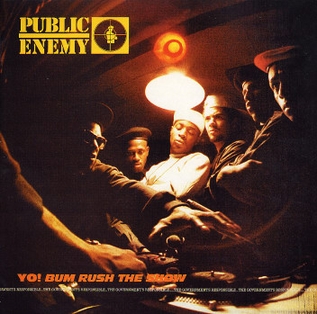
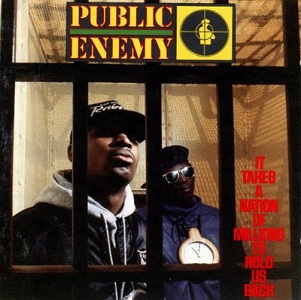


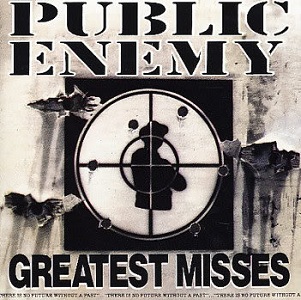
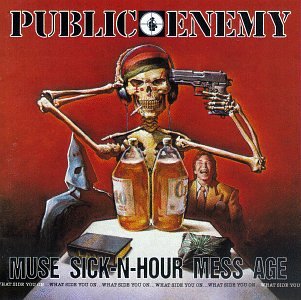


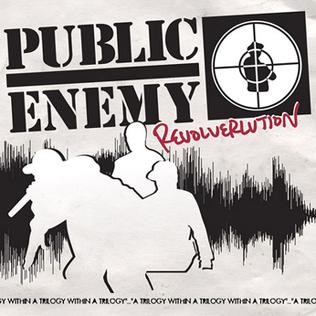



No comments:
Post a Comment